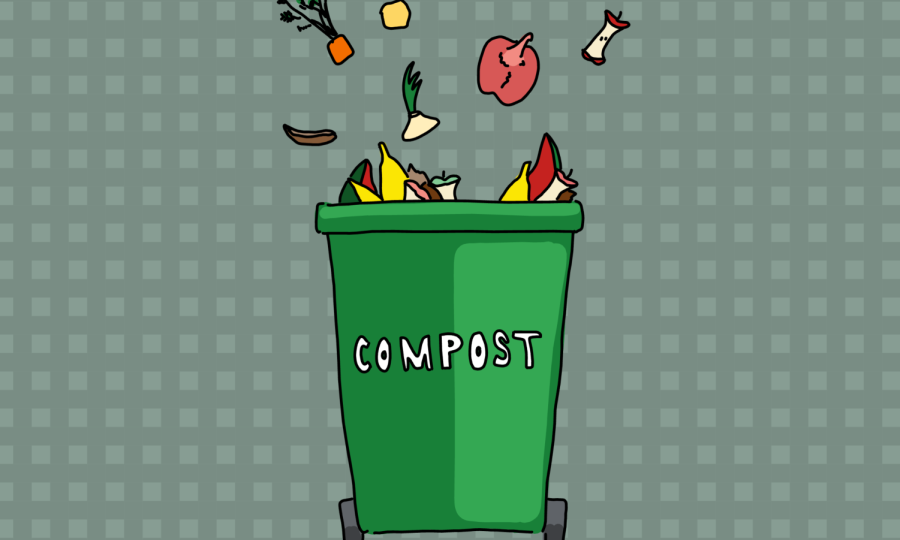After 10 years of advocacy, all District 65 lunchrooms begin composting
Daily file illustration by Gemma DeCetra
After shifting fully to composting in lunchrooms this December, District 65 students are incorporating sustainability into their daily routines.
January 12, 2023
At the end of lunch in every Evanston/Skokie School District 65 school, students sort their waste into landfill, recycling and compost bins, stacking their compostable trays on the side.
Making composting part of students’ daily routines was no small feat. After a decade of work, District 65 Sustainability Coordinator Karen Bireta said all buildings in the district began composting in December.
During the last academic year, students composted 77,955 pounds of food, eliminating more than 34 metric tons of carbon emissions by keeping waste out of landfills.
After working to rapidly expand the program over the past several months, Bireta said she is excited to see the new composting system’s impact on students within and beyond the lunchroom.
“We’re hearing a lot about students that are composting at home, and they’re excited to see that at school. We’ll even sometimes hear from parents that are not composting … asking, ‘How do I get the setup at home?’” Bireta said. “There’s been some really nice new habits that are forming at school, but then the students are taking home.”
The composting project has made the district a trailblazer in Illinois, according to Becky Brodsky, an Evanston parent whose two children attended District 65 elementary schools. She said district officials haven’t heard of any other district composting on such a large scale.
However, she and other advocates put in significant work to reach this point. Brodsky said she remembers noticing schools didn’t compost or recycle when her son started kindergarten more than a decade ago.
Along with several other parents, Brodsky said she began advocating for the district to add compost bins to the lunchrooms at her son’s school, the Dr. Bessie Rhodes School of Global Studies. The start of the program was a result of grassroots organizing, she said.
“For a while, we were storing the (compost storage bins) at my house because we live across the street from the school,” Brodsky said. “I had help from other parents … and over time I was able to talk to the principal about storing the (bins) on-site.”
The initiative began to take off about eight to nine years ago, when the district began working with Evanston-based composting organization Collective Resource Compost, Brodsky said. Over time, more District 65 schools slowly adopted composting with the help of the D65 Climate Action Teams — a group of parents advocating for sustainability measures districtwide.
While parent-driven efforts helped bring composting to the attention of officials, Brodsky said getting institutional support for the project was crucial.
“The idea can come from community members, but the district has to take ownership,” she said. “There has to be buy-in and understanding of why it’s important, and integration into the school district culture.”
Today, the district manages the composting program across all its school buildings. Though Brodsky said over half of the district’s lunchrooms were composting before the COVID-19 pandemic, she credited Bireta’s work with helping extend composting to the remaining school buildings since last spring.
Now, lunchroom staff and custodians help direct students to the proper lunchroom disposal bins, which were built by local sustainable development group Rebuilding Exchange Evanston.
Beyond the cafeteria, Nutrition Services Coordinator Kate Mason-Schultz said she worked with Bireta to make a slideshow so teachers can explain composting to students in the classroom.
With the program fully implemented throughout the district, Mason-Schultz said she’s felt inspired by seeing so many different staff members collaborate on composting.
“There’s a lot being done in the curriculum department, too,” she said. “It’s becoming a culture shift, which is exactly what we need it to do in order to be sustainable.”
Email: [email protected]
Twitter: @lilylcarey
Related Stories:
— D65 parent climate action team advocates for institutional climate change strategies
— District 65 works to upgrade from diesel-fueled buses to electric bus fleet
— City Council discusses need for community feedback on 5th Ward school plans


